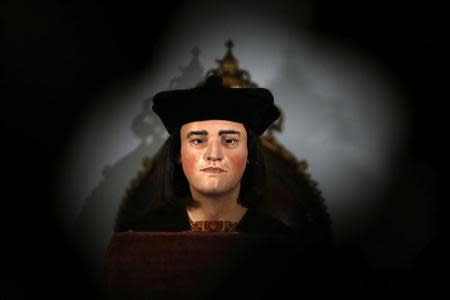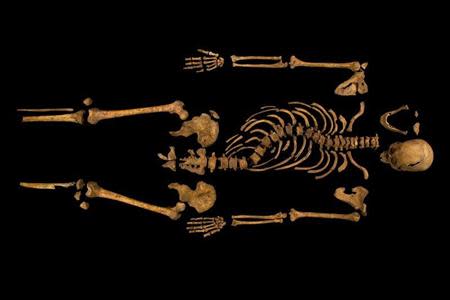Legal hostilities over England's King Richard III adjourned
By Michael Holden LONDON (Reuters) - A legal fight over the remains of England's King Richard III, discovered under a car park some 500 years after the medieval monarch was slain in battle, was adjourned until the New Year on Tuesday. The skeleton of Richard, whose death effectively ended a civil war known as The War of the Roses and whose reign has divided historians ever since, was discovered last year in one of the most remarkable English archaeological finds in recent times. His body was found under a parking lot in Leicester, central England, close to the site of the 1485 Battle of Bosworth where he was killed, the last English monarch to perish in battle. The University of Leicester, whose archaeologists found and exhumed the remains, were given permission from Britain's Ministry of Justice to re-bury the king at the cathedral in the city after DNA tests earlier this year confirmed the skeleton with a curved spine and head wounds was that of the king. But descendants of Richard, the last of the Plantagenet dynasty to rule, have started legal action arguing there should be a judicial review of the decision to issue the reinterment license as they want him to be buried instead in York, his northern powerbase during his 26-month reign. Their case, listed under "The Plantagenet Alliance Limited v the Council and College of Canons of the Cathedral of St Martin" was due to begin on Tuesday in the fitting setting of a grand wood-paneled court at London's Royal Courts of Justice. Leicester City Council gave permission for the dig to take place and says it is the public body with responsibility for the remains. After agreeing that the council should join the university and the Secretary of State for Justice as defendants, the legal hostilities were adjourned until next year. Gerard Clarke, the lawyer representing the Plantagenet Alliance, told three of England's most senior judges, wearing their traditional wigs and gowns, that the issue of what to do with a long-dead king as was "unique and unprecedented". "It stands apart from pretty well any other decisions," he said. The Wars of the Roses were named after the heraldic badges of the two combatants: the white rose of York and the red rose of Lancaster. They were a dynastic struggle between rival Plantagenet factions that lasted for about 30 years until Richard's defeat by Henry Tudor who took the throne as Henry VII. Depicted as a power-crazed hunchback by William Shakespeare, Richard famously died crying out "A horse, a horse, a kingdom for my horse" according to the unsympathetic playwright writing in the reign of Tudor Queen Elizabeth I. Historians have since been deeply divided over whether Richard was a monster who murdered his own nephews to take the throne, or had been unfairly maligned by his enemies. Clarke provoked laughter at the court when he promised to avoid Shakespearian language and avoid jocular references to "skeleton arguments", having realized he had made a reference to the council making "no bones about" one issue. Despite Tuesday's adjournment, Philippa Langley, the driving force behind the four-year search for Richard's remains, told Reuters she was pleased they were moving forward to burying the king with the "decency, dignity and honor" he had been deprived of in 1485. (Editing by Alison Williams)


